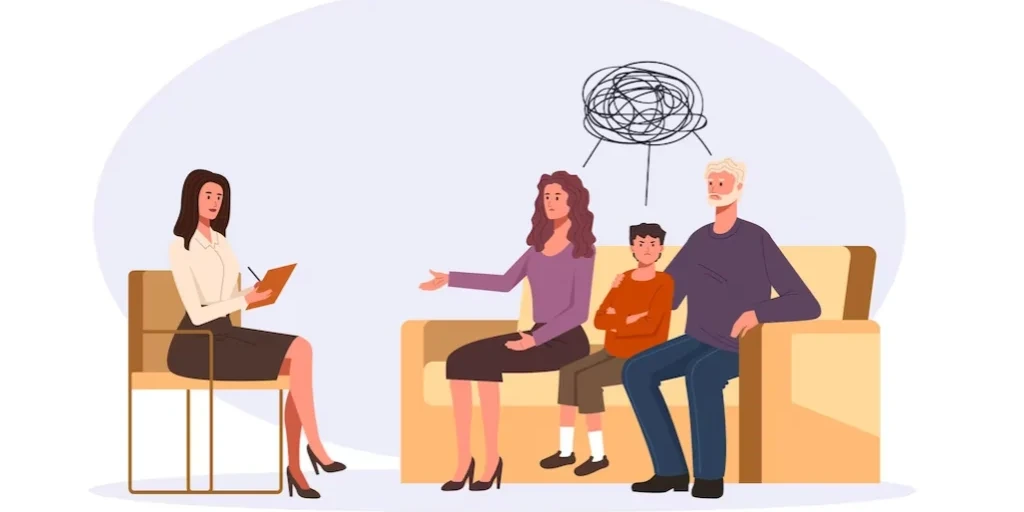24/7 Helpline:
(866) 899-111424/7 Helpline:
(866) 899-1114
Learn more about Eating Disorder Treatment centers in Bradley Beach
Eating Disorder Treatment in Other Cities

Other Insurance Options

Kaiser Permanente

UMR

Aetna

Holman Group

WellCare Health Plans

State Farm

Private insurance

EmblemHealth

CareFirst

Lucent

BlueCross

Horizon Healthcare Service

Coventry Health Care

GEHA

Health Net

Sliding scale payment assistance

United Health Care

Amerigroup

Medical Mutual of Ohio

Highmark










Recovery Innovations
Recovery Innovations stands as a dual-diagnosis addiction treatment center in Eatontown, NJ. Establi...

The Counseling Center
The Counseling Center at Freehold offers outpatient substance abuse treatment programs, including In...

Advanced Health and Education
Advanced Health and Education (AH&E) is located in Eatontown, New Jersey. Advanced Health and Educat...

High Focus Centers
High Focus Center in Freehold, New Jersey, is an inpatient and outpatient addiction center that trea...

CentraState Medical Center – Behavioral Health
CentraState Medical Center – Behavioral Health is a private rehab located in Freehold, New Jersey. C...

New Hope – Outpatient
New Hope Integrated Behavioral Health Care located in Freehold, NJ offers a comprehensive range of d...

New Hope – Philip House
New Hope- Philip House, located in Long Branch, New Jersey, provides halfway house accommodations an...

Little Silver Behavioral Health
Little Silver Behavioral Health provides a wide range of psychological services, applying behavioral...

New Hope – Mattie House
New Hope – Mattie House was founded more than 40 years ago and recognized that one size doesn’t fit ...

Unity Place of Mommouth County
Unity Place of Mommouth County is an outpatient rehab located in Oceanport, NJ. Unity Place of Mommo...

Relevance Behavioral Health
At Healing US Centers, we believe a combination of detoxification treatment, Integrative medicine, i...

Discovery Institute
Discovery Institute, located in Marlboro, New Jersey, is a holistic addiction and mental health trea...

CPC Behavioral Healthcare Aberdeen Counseling Center
CPC Behavioral Healthcare Aberdeen Counseling Center is a private rehab located in Matawan, New Jers...

White Deer Run of Allenwood
White Deer Run of Allenwood is a private drug rehabilitation facility in Allenwood, Pennsylvania. Su...






































































































































































































































































































































































































































































































































































































































































































Center for Vocational Rehab
Center for Vocational Rehab is a private rehab located in Eatontown, NJ. Center for Vocational Rehab...

Breaking the Chain Counseling
Breaking the Chain Counseling is a private rehab located in Port Monmouth, New Jersey. Breaking the ...

New Hope – Epiphany House – Long Branch
New Hope - Epiphany House - Long Branch provides halfway home services specifically designed for wom...

Family Growth
Family Growth is a private rehab located in Red Bank, New Jersey. Family Growth specializes in the t...

Monmouth Medical Center – Outpatient
Monmouth Medical Center – Outpatient is a private rehab located in Long Branch, New Jersey. Monmouth...

Gateway Day Treatment Program
Gateway Day Treatment Program is a private rehab located in Asbury Park, New Jersey. Gateway Day Tre...

Fritz and Matonti
Fritz and Matonti is a private rehab located in Red Bank, New Jersey. Fritz and Matonti specializes ...

Newman Springs Counseling
Newman Springs Counseling is a private rehab located in Red Bank, New Jersey. Newman Springs Counsel...

Behavioral Healthcare
Behavioral Healthcare is a private rehab located in Red Bank, New Jersey. Behavioral Healthcare spec...

Recovery Center
Recovery Center is a private rehab located in Cliffwood, New Jersey. Recovery Center specializes in ...

Addiction Specialists
Addiction Specialists offers outpatient treatment for individuals with alcohol and/or substance addi...

Bradley Therapy Associates
Bradley Therapy Associates is a private rehab located in Red Bank, New Jersey. Bradley Therapy Assoc...

Resa Treatment Center
Resa Treatment Center is a private rehab located in Keansburg, New Jersey. Resa Treatment Center spe...

Jersey Shore Daytox
Jersey Shore Daytox offers individualized and confidential opiate detoxification services. Services ...

CPC Integrated Health Helen Herrmann Counseling Center
CPC Behavioral Healthcare Red Bank is an alcohol and drug addiction treatment center for adults in R...

Colts Neck Consulting Group
Colts Neck Consulting Group offers outpatient treatment for individuals with alcohol and/or substanc...

Preferred Behavioral Health Group
Preferred Behavioral Health Group offers outpatient services for individuals with substance addictio...

U Turn For Christ
U-Turn for Christ is a Christian drug and alcohol addiction discipleship rehab in Freehold, New Jers...






















































































































































































